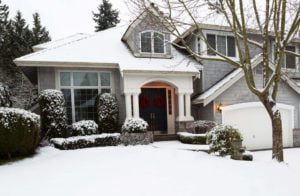
Photo of front yard of home during the holidays with fresh snow fallen that morning
The first snowflakes are drifting to the ground. And as property owners and their management teams start preparing homes for winter, we wanted to share some thoughts with you, the residents, about what you can do to ensure a safe, warm winter and save some money on utilities, too.
Things you can do yourself:
- Keeping pipes clear – By turning on the faucets to a trickle on very cold nights, you can prevent damage that’s both inconvenient and expensive to repair. Also, find out where your water main shut-off is in case something does occur and it needs to be turned off.
- Keeping tabs on the thermostat – We all like to be comfortable, but there’s no need to spend the winter in shorts. Unless you have pets at home, make sure to turn down the thermostat when you are sleeping or not at home to avoid heating an empty space. When you are awake and about, try to keep the temperature around 68° F or so.
- Reducing drafts in your home – Windows and doors can be a major source of heat loss in the winter, especially if the weather stripping isn’t making a good seal. If you find the weather stripping is in need of repair, talk to your property manager and property owner about replacements. In the meantime, you can use “draft snakes” to keep the cold air out.
- Using the sun without solar panels – By opening your curtains or blinds when the sun is shining your windows, you can use the sun to help warm the air in your home and reduce energy costs. At night, keep the blinds closed and use insulated curtains to keep the warmth in.
There are some things, however, that are up to your property manager and property owner to address in order to get your home structurally safe and sound for the winter. These include everything from addressing outdoor faucets to removing weak tree limbs. Take some time to check in with the property manager to ensure these items will be addressed – if needed – before the first snow.
Things to talk to your property manager about:
- Turning off exterior faucets – If your home has exterior faucets, it’s important to turn them off properly for the winter to prevent the pipes from freezing. The water will need to be fully drained and (depending on the type of faucet) the indoor shut-off value should be turned off.
- Removing leaves and debris from around outdoor compressors – Vegetation, including leaves and branches, can block the intake for your HVAC system and turn the unit into an inefficient drain on your utilities budget. Clearing this debris, as well as changing the filter, can help keep the unit running at peak performance.
- Cleaning gutters – Ice and snow damns caused by clogged gutters can not only cause roof damage, but can also cause water damage to your attic and even the basement when things sure the gutters are checked and cleared before the first snow to prevent any issues.
- Checking your furnace – Issues with your furnace—even something as small as a dirty filter—can result in significant problems beyond poor performance. To avoid potentially expensive and even dangerous issues, make sure a tune-up is performed before it gets cold.
- Asking about snow removal – It’s important to get on the same page with your property manager about snow removal before the first storm arrives. Find out who is expected to be responsible for shoveling or plowing, where vehicles need to be parked so the snow can be easily removed, and so on.
- Pruning branches – We’ve all seen how much damage snow-laden trees can do if branches snap and fall, taking out utility lines and marring property. Check to make sure branches that are dead or that could otherwise cause trouble if they fall are addressed.
- Inspecting the chimney – If you live in a home that features a useable fireplace, make sure the property manager arranges to have it cleaned and inspected before its first use. This will prevent any possible fire and health hazards from occurring.
Remember, as a full-time resident you know the state of your home better than anyone. Work together with the property manager to identify challenges that need to be addressed, and help secure your home for a safe, cozy, and energy-efficient season.
